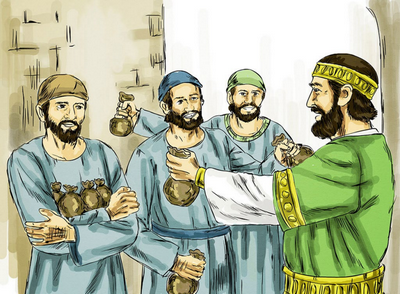                   |
(1) Jesus compared the Kingdom of the Heavens to a man departing on a journey. He called His own slaves and entrusted his possessions to them (Matt. 25:14).
(2) To each slave he imparted a sizable amount of money according to that slave’s ability. To one slave he gave five talents, to another two, and to the third, one talent. One talent might be worth sixteen or seventeen years of wages for a working man or a soldier. Five talents would be in excess of what a man could earn in a lifetime. Then the man departed on his journey (Matt. 25:15). (3) Immediately, the slave with the five talents traded with them and gained five more talents. So also, the slave with two talents gained two more. But the one who had received but one talent dug a hole and hid his master’s silver (Matt. 25:16-18). (4) After a long time the master of the slaves returned and settled accounts with them. The master commended the first slave, who had gained five talents: “Well done, good and faithful slave. You were faithful with a few things; I will put you in charge of many things. Enter into the joy of your master” (Matt. 25:19-21). (5) The second slave, who had gained two talents was also commended: “Well done, good and faithful slave. You were faithful with a few things; I will put you in charge of many things. Enter into the joy of your master” (Matt. 25:22-23). (6) The third slave reported that he knew the master was a hard master. He said he was afraid and hid his talent in the ground. Then he gave the single talent back to the master (Matt. 25:24-25). But the master called him a wicked, lazy slave, and scolded him for not at least placing the money in the bank where it could earn interest. He commanded the talent be taken away from the wicked slave and given to the slave who had ten talents (Matt. 25:26-28). He continued, “For to everyone who has, more shall be given, and he will have an abundance; but from the one who does not have, even what he does have will be taken away” (Matt. 25:29). The point is that faithfulness in service will be rewarded with even greater opportunities for service. (7) Then he commanded, “Throw out the worthless slave into the outer darkness; in that place there shall be weeping and gnashing of teeth” (Matt. 25:30). (8) This parable of the Talents is closely related grammatically to the preceding parable, that of the Ten Virgins (Matt. 25:1-13). Both parables are in the time sector following the return of Christ (Matt. 24:29-31). Since the preceding parable (Ten Virgins) directly affected Israelis who survived the Tribulation, we conclude that this present parable (Talents) also directly affects Israelis who survived the Tribulation. (9) Comparative applications of the two adjacent parables. The main thrust of the first parable (Ten Virgins) is the importance of preparedness for the return of Christ. The main thrust of the second parable (Talents) is the importance of dedicated service on behalf of the returning Christ. (10) Conclusion: We conclude that the main teaching of this parable is the importance of faithful service in accordance with the abilities one has been given. That will be the standard applied to all Israelis alive at the end of the Tribulation period. Those who have served the King faithfully will have something to show for it and will be permitted to enter His Kingdom joyfully. Those who have not served the King faithfully will have nothing to show for their non-effort, and they will be excluded from the Kingdom. Moreover, they will find themselves in “outer darkness” – a place where there will be perpetual sorrow and misery. This appears to refer to the Lake of Fire and Brimstone. (11) Application for the Church. It is important that every Christian be prepared for the return of Christ at the Rapture. It is also important that every Christian be faithfully serving Christ to the best of his abilities as he awaits Christ’s return at the Rapture. Can one draw the conclusion that a professing Christian who is unprepared for Christ’s return at the Rapture, and who is not faithfully serving Christ to the best of his abilities prior to Christ’s return at the Rapture is not actually a Christian? Possibly so, but that is not the message of these two parables. If you wish to evaluate Christ’s judging of Church-Age Christians, it would be better to derive one’s conclusions from a careful study of the Judgment Seat of Christ (Rom. 14:10-12; 1 Cor. 3:10-15; 2 Cor. 5:6-10).
|
|||||

